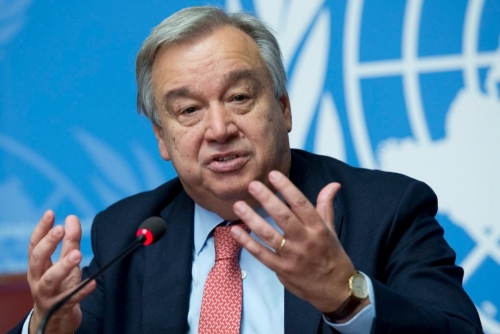UN Chief Warns of Risks to Middle East Peace Amid Uncertain Path for Gaza and West Bank
TDT | Manama
Email: mail@newsofbahrain.com
In a candid discussion with Børge Brende, President and CEO of the World Economic Forum, UN Secretary-General António Guterres outlined his vision for the Middle East and the global challenges that lie ahead, following his special address at the World Economic Forum in Davos.
Middle East in Transition
Guterres expressed cautious optimism about recent developments in the Middle East, particularly the ceasefire in Gaza. He credited the United States, Qatar, and Türkiye for their persistent diplomatic efforts in achieving the truce and securing the release of hostages.
“We witnessed robust diplomacy at work,” Guterres said, highlighting the role of the U.S. President-elect in shifting the dynamics that led to the ceasefire. However, he warned that the path forward remains uncertain, with the region at a crossroads between a potential two-state solution and further fragmentation.
In Lebanon, the Secretary-General noted that the ceasefire is holding, offering hope for an effective government and reconstruction. However, he acknowledged lingering risks to long-term peace.
Turning to Syria, Guterres identified a pivotal moment. While a new government has shown signs of inclusivity, he emphasized the need for comprehensive representation of all communities, including Kurds, Alawites, and Christians. He called for easing sanctions to alleviate suffering and incentivize progress toward stability.
Iran’s Role in Regional Security
Guterres emphasized the importance of Iran taking steps to renounce nuclear ambitions and engage in regional security dialogue. “It’s crucial for Iran to make a clear commitment to peace,” he stressed, warning of the risks of escalation. He expressed hope for a new regional security framework that respects sovereignty and fosters economic integration.
Broader Global Challenges
The Secretary-General extended his analysis beyond the Middle East, addressing the rise of proxy wars in Africa and the Sahel, as well as the worsening geopolitical divides fueled by the Russian invasion of Ukraine and tensions between the U.S. and China. These divisions, he argued, have created an environment of global impunity.
“Accountability is essential,” Guterres stated, pointing to the need for greater international cooperation to address human rights violations and conflicts fueled by external interference.
Reforming Multilateral Institutions
Guterres underscored the need for reform within the UN Security Council, citing its outdated composition and lack of representation. “The Security Council must reflect today’s world to remain effective and legitimate,” he said, referencing discussions from the recent Summit of the Future.
Hope in Technology and Youth
Despite the challenges, Guterres highlighted opportunities in technological advancements and renewable energy. He predicted that scientific progress would drive a shift away from fossil fuels, labeling investments in them as “investments in obsolescence.”
He also expressed confidence in the younger generation’s commitment to global well-being, describing them as “more cosmopolitan and sensitive to the planet’s needs.”
Call for Determination
In closing, Guterres urged a determined approach to addressing global issues. “The question is not optimism or pessimism,” he said. “It’s about determination. If we fight for the right values and principles, we will prevail.”
The discussion underscored the interconnected nature of today’s global challenges and the urgent need for collaborative solutions. As leaders gathered in Davos, Guterres’ call to action served as a poignant reminder of the stakes and opportunities in shaping the future.
Related Posts

